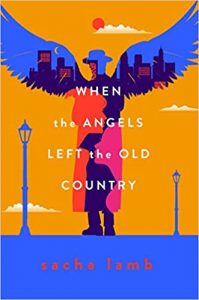 When the Angels Left the Old Country by Sacha Lamb
When the Angels Left the Old Country by Sacha Lamb Narrator: Donald Corren
Format: audiobook, eARC
Source: supplied by publisher via NetGalley
Formats available: hardcover, ebook, audiobook
Genres: fantasy, historical fantasy, historical fiction, magical realism
Pages: 400
Length: 9 hours
Published by Levine Querido on October 18, 2022
Purchasing Info: Author's Website, Publisher's Website, Amazon, Barnes & Noble, Kobo, Bookshop.org, Better World Books
Goodreads
For fans of “Good Omens”—a queer immigrant fairytale about individual purpose, the fluid nature of identity, and the power of love to change and endure.
Uriel the angel and Little Ash (short for Ashmedai) are the only two supernatural creatures in their shtetl (which is so tiny, it doesn't have a name other than Shtetl). The angel and the demon have been studying together for centuries, but pogroms and the search for a new life have drawn all the young people from their village to America. When one of those young emigrants goes missing, Uriel and Little Ash set off to find her.
Along the way the angel and demon encounter humans in need of their help, including Rose Cohen, whose best friend (and the love of her life) has abandoned her to marry a man, and Malke Shulman, whose father died mysteriously on his way to America. But there are obstacles ahead of them as difficult as what they’ve left behind. Medical exams (and demons) at Ellis Island. Corrupt officials, cruel mob bosses, murderers, poverty. The streets are far from paved with gold.
P R A I S E
“Liars, lovers, grifters, a good angel and a wicked one—all held together with the bright red thread of unexpected romance, enduring friendship and America’s history. You don’t have to be Jewish to love Sacha Lamb—you only have to read.”—New York Times Bestseller, Amy Bloom
★ “Steeped in Ashkenazi lore, custom, and faith, this beautifully written story deftly tackles questions of identity, good and evil, obligation, and the many forms love can take. Queerness and gender fluidity thread through both the human and supernatural characters, clearly depicted without feeling anachronistic. Gorgeous, fascinating, and fun.”—Kirkus (starred)
★ “Richly imagined and plotted, this inspired book has the timeless feeling of Jewish folklore, which is further enhanced by the presence of two magical protagonists, and not one but two dybbuks! In the end, of course, it’s the author who has performed the mitzvah by giving their readers this terrific debut novel.”—Booklist (starred)
“I LOVE THIS BOOK SO MUCH!!!! I read it in two days and then I spent the next two weeks thinking about it. Literally forgot to take my lunch break at work because I was busy thinking about it. This book is SO fun and funny and beautiful. Inherently, inextricably deeply queer-and-Jewish in a way that makes my brain buzz. I am obsessed.”—Piera Varela, Porter Square Books
“I love this book more than I can say (but I’ll try!) I was delighted by the wry narrative voice of this book from the first paragraph. The author perfectly captures the voice of a Jewish folk tale within an impeccably researched early 20th century setting that includes Yiddish, striking factory workers, and revolutionary coffee houses. It gave me so many feelings about identity, love, and their obligations to the world, themselves, and each other. This story will forever have a place in my heart and in my canon of favorite books. I can’t wait to have it on my shelves!”— Marianne Wald, East City Bookshop
“A beautiful story of an angel and demon set on helping an emigrant from their shtetl, and the fierce girl that joins them on the way... A must read for all ages—one filled to the brim with heart.”—Mo Huffman, Changing Hands Bookstore
My Review:
This is utterly lovely, but I’m not sure any description could do it justice. It’s just such a surprising mélange of fantasy, historical fiction and magical realism set in a time and place that manages to be both far away and very close, all at the same time.
It’s also steeped in the experiences of Jewish immigrants from the Pale of Settlement in Eastern Europe to the new, exciting, strange and sometimes dangerous “golden land” of America. And in this particular case, all the ways they got fleeced and all the ways they fought back and endured along the way.
What makes the story so much fun and works so very well is that the story is told from the perspectives of Little Ash the demon and his study partner – an angel who begins the story with no name at all. Little Ash is a very small demon with very little magic, while his friend the angel hears the voice of heaven and lets it guide him into good deeds. Which, most of the time, consists of keeping his friend the demon busy studying the Torah and the Talmud.
But Little Ash is getting bored in their tiny shtetl, so small it doesn’t even have a name. The demon wants to follow all the young people from their shtetl who have left for America, because they were all the interesting people he enjoyed following while they made a bit of mischief. Which Little Ash likes very much.
Little Ash searches for a way of convincing the angel to go to America with him. When they learn that Simon the baker’s daughter Essie arrived in America but hasn’t written since, they have a mission. A mitzvah, or good deed, that the angel can undertake, and a whole lot of mischief that Little Ash can make along the way.
Neither of them is remotely prepared for what they find, not along the way, and certainly not after they arrive in America.
 Escape Rating A+: In the foreword, the publisher claims that they’ve been referring to this book as the “queer lovechild of Philip Roth and Sholem Aleichem” – which is a lot to live up to. I think it read as Good Omens and Fiddler on the Roof (the original story for which was written by Sholem Aleichem) had a book baby midwifed by The Joys of Yiddish by Leo Rosten (which I wish I popped up every time there was a Yiddish or Hebrew phrase that I don’t remember – but don’t worry, there’s a glossary at the end) resulting in When the Angels Left the Old Country. Up to and including the ineffable relationship that is finally acknowledged at the end.
Escape Rating A+: In the foreword, the publisher claims that they’ve been referring to this book as the “queer lovechild of Philip Roth and Sholem Aleichem” – which is a lot to live up to. I think it read as Good Omens and Fiddler on the Roof (the original story for which was written by Sholem Aleichem) had a book baby midwifed by The Joys of Yiddish by Leo Rosten (which I wish I popped up every time there was a Yiddish or Hebrew phrase that I don’t remember – but don’t worry, there’s a glossary at the end) resulting in When the Angels Left the Old Country. Up to and including the ineffable relationship that is finally acknowledged at the end.
The story is told from the perspectives of Little Ash and the angel, who initially does not have a name and never takes on a gender no matter what its identity papers say. And the story is significantly the angel’s journey from being an entity that exists mostly as a vessel to serve the purposes of heaven to a person in its own right. Without a name, it doesn’t have an identity of its own to hang its memories on, to help it retain any purpose of its own. It’s easily overwhelmed by competing thoughts and missions.
Little Ash likes that his friend is a bit forgetful and easily manipulated. He’s able to get away with rather a lot. But Little Ash is a small demon with little magic and small sins. He likes causing trouble but even that is a bit childlike. As childlike as the angel’s innocence.
One of the things they lose on the trip to America is their naivete. The angel, now calling himself Uriel, still tries to see the good in everyone – but now it can see the evil as well even if it doesn’t want to. Little Ash, who always looked for people’s sins, can see more of the good and feel more duty towards fostering that good than he ever imagined.
When they arrive in America they become deeply involved with the Jewish immigrant community on Hester Street, taking on the cheats who keep people nearly enslaved to the garment shops, getting caught in the middle of a strike – and doing their best to exorcise not just one but two dybbuks – malicious spirits who haunt evildoers hunting for revenge.
With the help of their friend Rose, a young immigrant they met in steerage on the way to America, with more than a little bit of mischief and a whole lot of seeing the best while preparing for the worst, they manage to rescue Essie and make a new life for themselves in America.
Still studying Torah and Talmud, and always together.
Personally, I found this book to be utterly enchanting. An enchantment that was multiplied by listening to the audiobook as narrated by Donald Corren. My grandparents were part of the same immigrant generation as the characters in When the Angels Left the Old Country. My mom’s parents came from the Pale of Settlement just as everyone in this story did. (My dad’s parents came from a bit further south and west.) Everyone in my grandparents’ generation spoke Yiddish as well as English – and generally used Yiddish as a way of hiding what they were talking about from child-me. The rhythms of their speech, whether in Yiddish or in English, sounded just the way that the narrator reads this book. It was a bit like sitting in the room when they spoke with my great-aunts and uncles, hearing the sounds of all their voices and the way that the ‘mother tongue’ of Yiddish influenced not just their accents but the way they phrased things, even in English.
In other words, I loved this book for the story it told, and I loved the narration for the nostalgia it invoked. For this listener, the entire experience was made of win. I hope you’ll feel the same.
